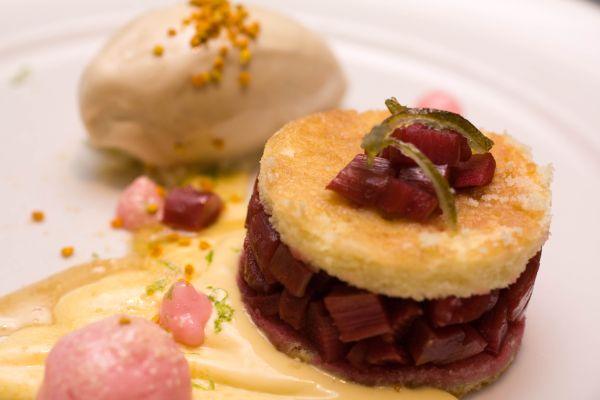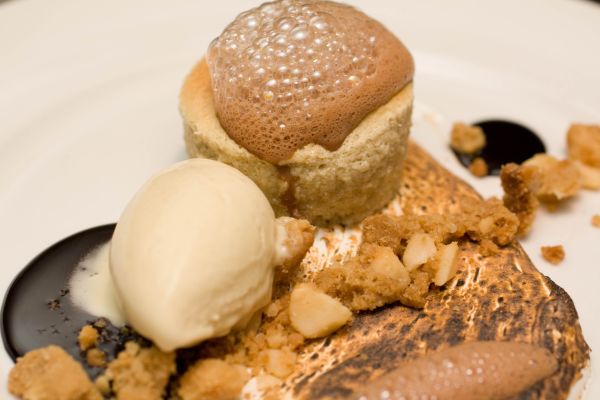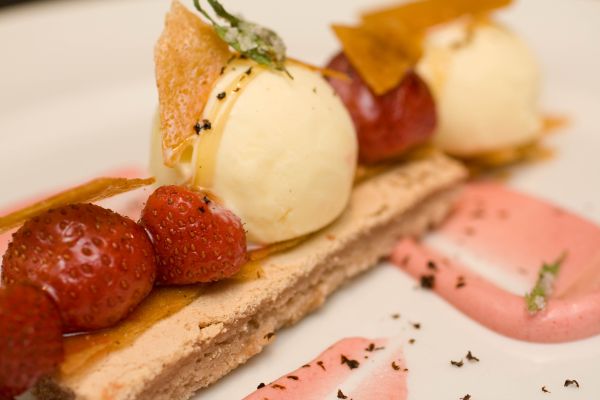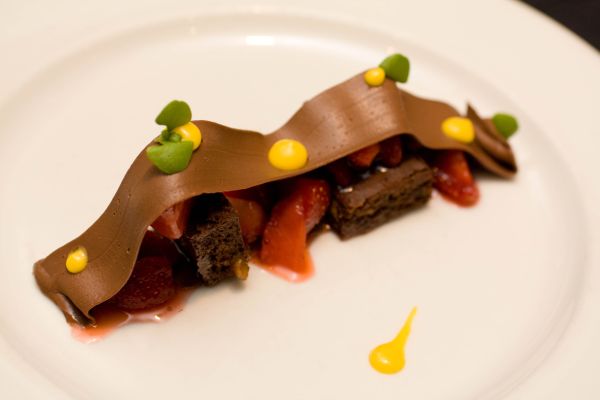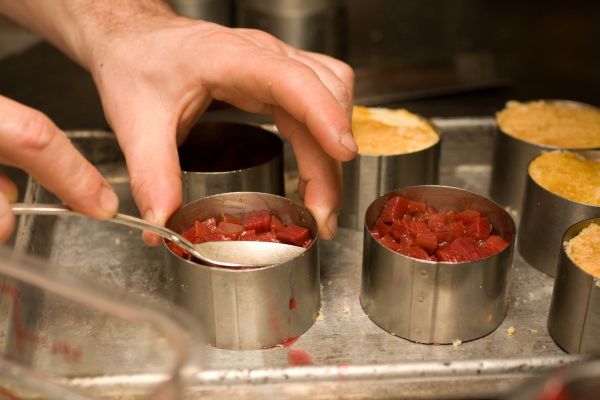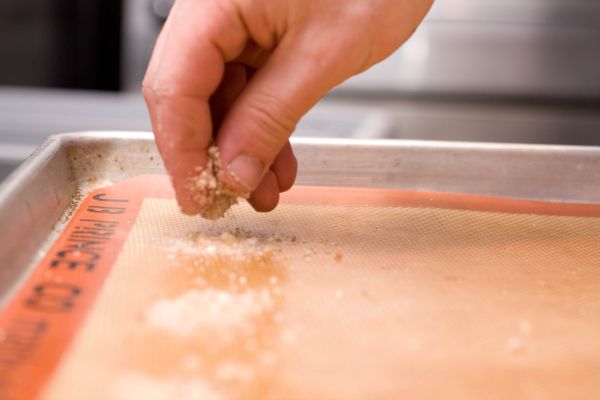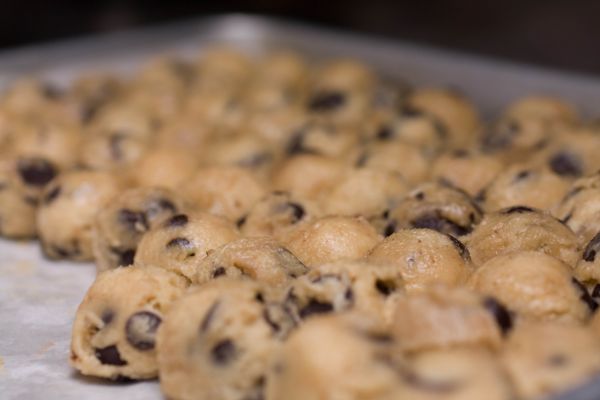Interview: MK's Pastry Chef Tony Galzin
By L. Stolpman in Food on Jul 6, 2009 6:00PM
We were fortunate enough to spend some time in MK's kitchen with Pastry Chef, Tony Galzin. In addition to letting us peek over his shoulder as he plated desserts, he answered questions on how he became a pastry chef, trends in the industry, seasonal ingredients and how to best incorporate and enjoy dessert. Also, tomorrow, we will feature video of Chef Galzin working in the kitchen.
Chicagoist: I think our readers would like to know more about how what makes a pastry chef a pastry chef - did you study baking and pastry arts? How/when did you find yourself gravitating toward pastry?
Chef Tony Galzin: I actually never went to culinary school. Its kind of weird. When I started cooking I never had much interest at all in pastry. I think I figured I would end up being a bad ass line cook. I sort of idolized Mario Batali, and really just wanted to do rustic Italian. Pretty much the opposite of what I do now.
My first chance to learn pastry came when I was working for Chef Dale Levitski at Trio in Evanston. I was working sautee, and there was an opening at pastry assistant for Chef Mary McMahon. Dale approached me about moving over, and suggested it would be a good chance to get well rounded. I took the position, and Mary basically took me under her wing. At first, I'm pretty sure I was a total wreck, because I really knew very little to nothing about pastries.
After Trio closed I bounced back and forth between savory and pastry. I had the opportunity to work for Elizabeth Dahl (Boka) when she was at Naha. She really exposed me to some cool techniques I had never seen before, and that's when I really started considering pursuing pastry as a career.
I think to be a great pastry chef you need to find your own identity and style, and challenge yourself to try new things, but still make it fit within the framework and vision of the restaurant that you're at. Dessert should be thought of not as something that you splurge on, and get if you still have a little room left in your tummy, but as an extension of the meal; as important as the first course you eat. It's the last thing you leave the restaurant remembering, so the pastry chef has a great responsibility in finishing the dining experience.
C: Are there current trends/techniques in pastry? If so, what is trendy in the pastry world right now? For example, has molecular gastronomy been incorporated in your pastry dishes?
CTG: Well, for sure some of the pastry chefs that get the most recognition have clearly defined their own style, and executed it to the point that they've set themselves apart. Whether that be a more savory leaning dessert menu, the incorporation of new, and experimental techniques, or the perfect execution of classics.
From what I see, there is a definite trend when it comes to molecular gastronomy, and the incorporation of food additives, and new techniques to dessert components. And that can be good. Certain things like stabilizers or hydrocolloids allow us to achieve textures and elements that weren't really possible before. I just think that you need to be careful, and make sure your overall technique is grounded before you start throwing all kinds of gels and foams on your plate. At MK, I try to harmonize these things, so that the final dessert is really what I'm looking for.
C: Do you have a particular style when it comes to your desserts (i.e. a mixture of sweet and savory)?
CTG: Hmm. Its hard for me to say. I think that if you looked at all my dishes together, you could definitely tell that the same person was behind them. As far as looking at a photo of a dessert, and being like,"Oh, that's a Tony dessert," I don't think I'm there yet!
I will say that my desserts tend to be very playful, though. And that goes all the way down to giving them cutesy names! However, at this point I'm most concerned with the overall impact of the dish. If incorporating an element that is typically savory into a particular dessert seems to work, then I'm all about it. I won't go out of my way to do so, though. Again, if you think of desserts as an extension of the meal, then the most important thing is the proper balance of textures, flavors, temperatures, etc.
C: What seasonal ingredients do you like to incorporate into your dishes? How often to you re-vamp/create new dishes?
CTG: When I start thinking about new desserts its entirely based on seasonality. For example, now its absolutely strawberry season, and I'm going ape on the berries. When stone fruits, and melons start, those will be the focus. But even as far as just a chocolate dessert, or something classic like a carrot cake. I try to think, is this a summer or a fall chocolate dish? Is it too heavy, or hot to eat on a summer day? If so, you save that idea for later, and start thinking about something else.
My main dessert menu will kind of rotate new dishes on and off as seasonal produce starts to become available. We have a degustation menu too, which changes every three weeks, so that one really tends to be super-seasonal. I can use things like cara cara oranges or even violets, that really have a short market appearance.
C: Do you have a vision or goal in mind when you create a dessert? Do you think some desserts complement a meal more than others? What's better with dessert: coffee or wine?
CTG: Totally. My goal is that the table starts fighting over the last bite, and texting their friends to get in here for dessert!
Honestly, though when it comes to having a vision with a dish it starts with an ingredient, and then how that fits into the confines of the menu. For example if my initial thought was to use strawberries for a cobbler, but I already have a rhubarb cobbler on the menu, I have to go a totally different direction with it. Sometimes that’s how you end up with something cool you weren't even thinking about at the beginning. And also, using strawberries and rhubarb as an example, they are a natural flavor pairing. But when spring when coming around I kept it in my head that I wanted to separate them, so that eventually I could have those on the menu as two different desserts. So then I started working with other flavor parings to both. That's how I ended up with the desserts I have now. Rhubarb, honey, crème fraiche, and key lime. Strawberry, reisling, ginger, and licorice.
And I always prefer a cordial, dessert wine, or sparkling wine with dessert. I save coffee for the very end. It's too strong of a flavor. You wouldn't drink coffee with your entrees, because you want to taste them. The same thing applies.
C: If we were going to MK tonight and saved all our calories for pommes frites with truffle cream and dessert...what dessert would you suggest and what wine should we have with it?
CTG: Hmm. Well, the desserts I most often send to people are the "Two bananas walk into a bar", and "It's rhubarb, honey". For the banana dessert we like to send The Rare Wine Co. Historic Series, New York Malmsey, Special Reserve Madiera. For the rhubarb we like to offer a 2006 Kracher, Cuvee Beerenauslese. See? Way more fun than an espresso!
